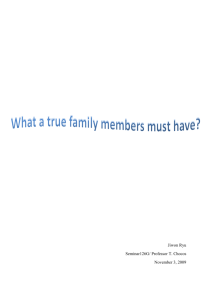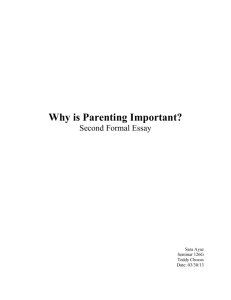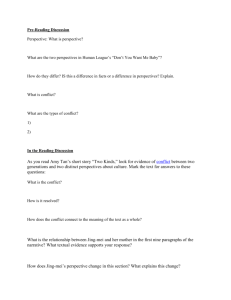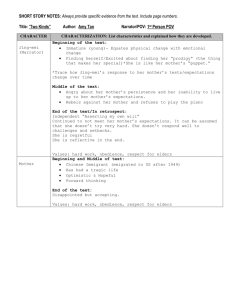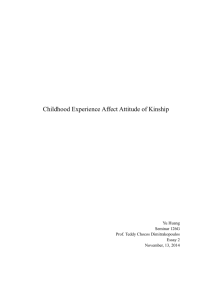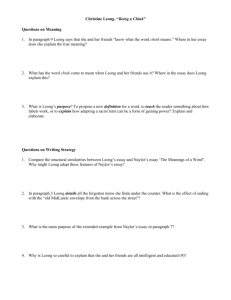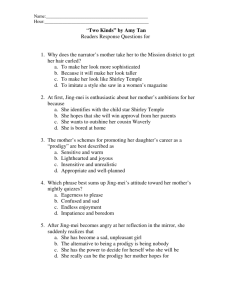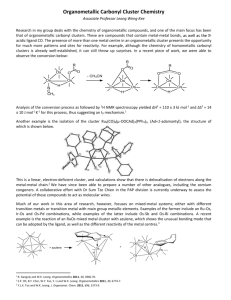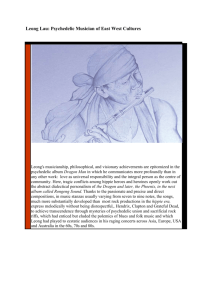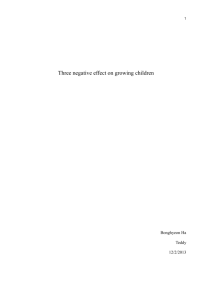Negative Relations Between Parents and Children Tiffany Liu
advertisement
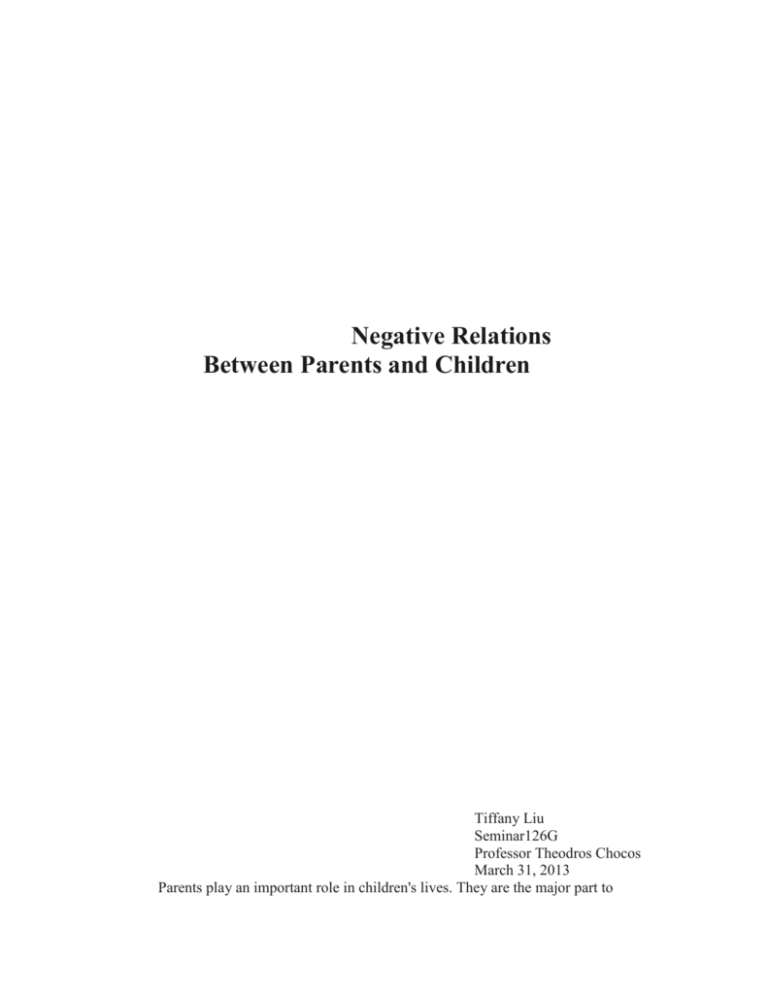
Negative Relations Between Parents and Children Tiffany Liu Seminar126G Professor Theodros Chocos March 31, 2013 Parents play an important role in children's lives. They are the major part to maintain a family and the relationships between their children. Their roles could affect the relationship between their children. Children could easily affected by their parents because parents are their first instructor to teach them, which is the most significant part of children growing; it is where they start to learn about life. But not all parents are teaching in the same way. Parents always want their children to have a good future. In some families, parents like to educate their children in very strict ways such as decide a path for them, having high expectations on them, and control their lives. The parents think they are helping children when they put pressure on them while children feel it is a threat to them. When they feel that way, they start to resist. Some other parents understand their children and try to let their children be the way they want. The relationships between parents and children like that usually would work out better. A bad relation in a family is based on parents being strict to their children and showing negative demonstrations to them. If parents show bad demonstration to their children, they might copy the same thing from their parents or that could have negative effects on them. Parental divorce is totally a bad demonstration showing to children because separation of parents is not what they want to see. That could hurt them very badly inside. At the same time, the conversation between parents and children would also slowly become less. The scholarly journal “Adult Child-Parent Relatioships” by Diane N. Lye indicates that parent's divorce is most affecting the relationship between parents and children. Lye states “parental divorce greatly weakens adult children's relationships with their fathers and also tends to weaken relationships with mothers” (79). Children at a young age are always feel everything is perfect and see their parents as smart and powerful who is always there to protect them. The effects of parents divorce would cause the children mental problem such as feeling the lose of security, hatred toward others, and depressed. Their personality would also change oddly and feel lose the love from their parents. At this time, the relationships between each other obviously would become weaker because parents divorce is a hurt to children. When they feel that way, they do not want to talk to their parents. Parents should be responsible for their children. As parents, they need to know how they should raise their children and should always concern about their position. This is what parents should do in order to keep the good relationship in a family. The parents who don’t know how to express their love to their children could decrease the atmosphere in the family. In one of Russell C Leong’s stories, “Notes from a Son to His Father”, he writes about the relationship between his father and him. His father is a person who not only being strict, but also does not know how to express his feeling to Leong. Because of feeling his father’s coldness, he always thinks his father is showing no love to him. In this situation, the father and son would have problem to communicate with each other. His father is good at cooking and good at doing something with hands, but he is just not good at making communication with his son. Leong describes his father that“at the door to [his] room, [his ] father is glittering in anger, a knife poised in his hand. His face is pulsing pink, the once place cauliflower flesh tinged with color and range and he is on one side of the room, about to throw the knife into [him]. [He is] just standing there, cringing; how can [he] defend [himself] against this violence'' (Leong 95). Leong’s father uses violence to communicate with Leong instead of speaking to him. Because his father always showing this attitude to Leong, he feels scare and that makes him want to avoid his father. In his father’s mind, he might thinks that is right way to teach Leong, but Leong thinks that way would only give him pressure because every time he sees his father he is with a nervous mood. When a son who wants to avoid his father and his father who hardly to express his feeling, this kind of relationship would slowly become stiff. Those parents who have the personalities like Leong’s father would also scare their children. When the children are afraid of their parents, they do not dare to speak or communicate with them because they think no matter how good they are doing, their parents still have the same attitude toward them. So instead of not to get scold from them, they would choose not talk to them. Mostly, the change of family relationship is caused by the parents. As a father or mother, he or she should talk to their children with a harmonious manner if they want build a good relationship in the family. Parents being strict would weaken the sentiment between them and their children. In Amy Tan’s “Two Kinds”, Jing-mei Woo has the similar situation. Jing-mei Woo's mother is originally come from China who uses the Eastern traditional education to teach Jing-mei. As an Eastern parent, she has high expectations for her daughter, especially when she believes that every one could be possible to become famous in America. From then on, she reposes this dream on Jing-mei. In order to let Jing-mei to be a prodigy, her mother makes her to take tests every night after dinner but she unfortunately fails. Her mother feels upset and disappointment. However, she does not give up. One day she sees a girl who can play piano very good on TV. She attracts by this young girl’s great piano skill and her fame. At that moment, she decides to train Jing-mei to be same as that girl. She forces her daughter to take the piano lessons. Jing-mei resists but her mother warns her “only two kinds of daughters, those who are obedient and those who follow their own mind! One kind of daughter can live in this house. Obedient daughter!” (84). Under her mother’s control, she does not have choice to be which kind of daughter. Her mother stops what she likes and keeps control of her to be her obedient daughter. She obviously wants to become whomever she wants and that is the ordinary girl. As far as the prodigy side of her, she is not interested in it at all. In the beginning she already says to herself that “I won’t let her change me, I promised myself. I won’t be what I’m not” (79) and she still insist on this belief no matter how her mother changes her. Because of her mother's strict education toward Jing-mei, she changes herself negatively. Jing-mei becomes rebellious that she attempts to fail many things on purpose such as the failing on the talent show, getting low grade in school, and drops out of college. Their relationship become worse and worse. The relationship never gets fixed until the moment when her mother dies. Parents educating their children in strict ways can make their children successful but that would cause to weaken the relations. No matter what kind of role the parents play, it would have good effect or bad effect on their children. It would be a good effect to children if the parents understand and concern about their children, especially when they concern on whether their children is growing healthily in mental and physical ways. It would be bad for children if parents are being too strict to their children and showing negative demonstrations to them. If parents want to maintain a good relationship in the family, they should first think about how they act toward the children and make sure they should create good effects for their children. Bibliography Lye, Diane N. "Annual Review of Sociology." Adult Child-Parent Relationships 22 (1996): 79-102. JSTOR. Web. 31 Mar. 2013. Leong, Russell C. "Notes from a Son to His Father." (n.d.): 94-97. Print. Tan, Amy. "Two Kinds." (n.d.): 76-86. Print. White, E.B. "Once More to the Lake." (n.d.): 42-44. Print.
